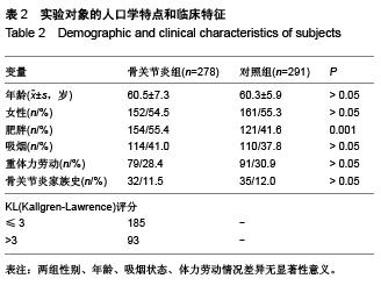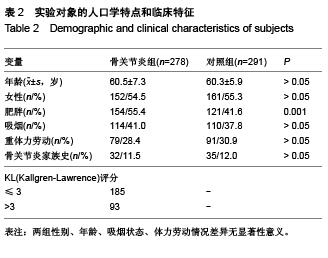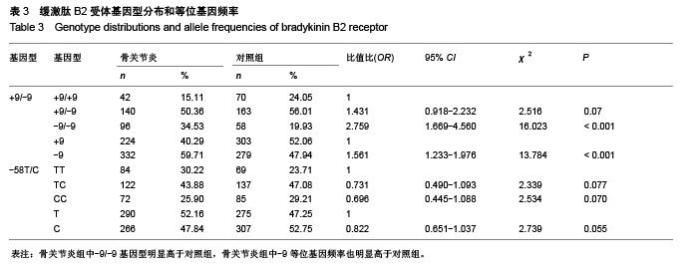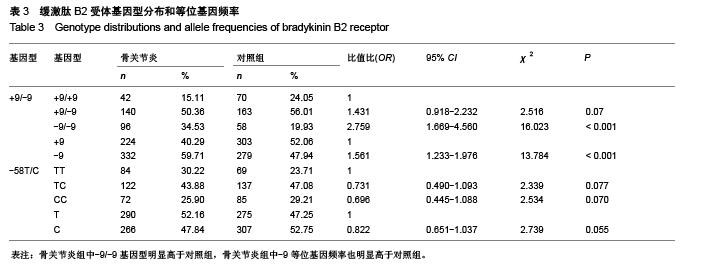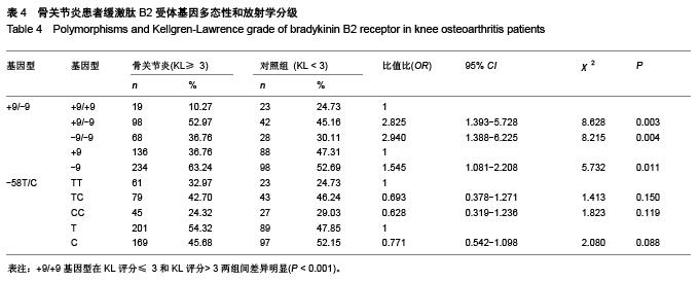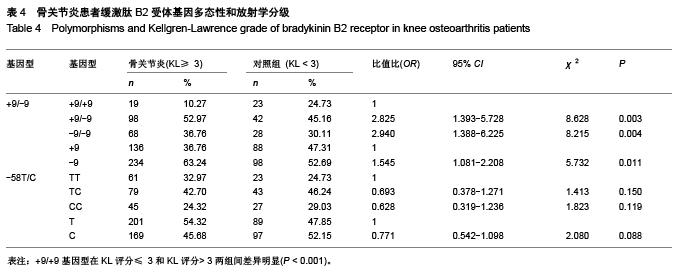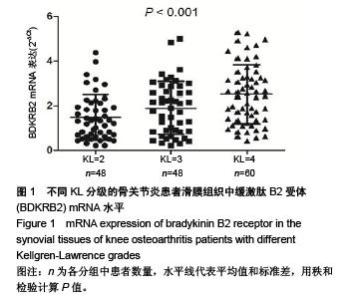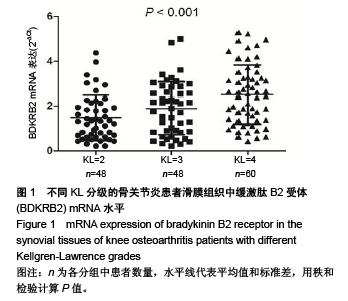Chinese Journal of Tissue Engineering Research ›› 2015, Vol. 19 ›› Issue (51): 8208-8212.doi: 10.3969/j.issn.2095-4344.2015.51.002
Previous Articles Next Articles
Bradykinin B2 receptor gene polymorphisms influence the susceptibility of knee osteoarthritis
Feng Hui1, Feng Hu2, Guo Kai-jin2, Chen Shuo3, Yuan Feng2
- 1Graduate School of Xuzhou Medical College, Xuzhou 221000, Jiangsu Province, China; 2Department of Orthopedics, Affiliated Hospital of Xuzhou Medical College, Xuzhou 221000, Jiangsu Province, China; 3Department of Orthopedics, Nanjing General Hospital of Nanjing Military Command, Nanjing 210002, Jiangsu Province, China
-
Received:2015-10-28Online:2015-12-10Published:2015-12-10 -
Contact:Yuan Feng, M.D., Chief physician, Department of Orthopedics, Affiliated Hospital of Xuzhou Medical College, Xuzhou 221000, Jiangsu Province, China Corresponding author: Chen Shuo, M.D., Attending physician, Department of Orthopedics, Nanjing General Hospital of Nanjing Military Command, Nanjing 210002, Jiangsu Province, China -
About author:Feng Hui, Studying for Master’s degree, Attending physician, Graduate School of Xuzhou Medical College, Xuzhou 221000, Jiangsu Province, China -
Supported by:the National Natural Science Foundation of China, No. 81301582; Military Medical Development
Project for the Youth, No. 13QNP044; China Postdoctoral Science Foundation, No. 2015M572812; the Clinical Medicine Scientific Special Fund of Jiangsu Province, No. BL2012002
CLC Number:
Cite this article
Feng Hui, Feng Hu, Guo Kai-jin, Chen Shuo, Yuan Feng . Bradykinin B2 receptor gene polymorphisms influence the susceptibility of knee osteoarthritis [J]. Chinese Journal of Tissue Engineering Research, 2015, 19(51): 8208-8212.
share this article
| [1] Bonnet CS, Walsh DA. Osteoarthritis, angiogenesis and inflammation. Rheumatology (Oxford).2005;44:7-16. [2] Wang H, Tian Y, Wang J, et al. Inflammatory cytokines induce NOTCH signaling in nucleus pulposus cells: implications in intervertebral disc degeneration.J Biol Chem.2013;288(23): 16761-16774. [3] Bae Y, Park S, Seon K, et al. Biomechanical analysis of the effects of medial meniscectomy on degenerative osteoarthritis. Med Biol Eng Comput.2012;50(1): 53-60. [4] Esser S, Bailey A. Effects of exercise and physical activity on knee osteoarthritis. Curr Pain Headache Rep.2011;15(6): 423-430. [5] Schenker L, Mauck L, Ahn J, et al. Pathogenesis and prevention of posttraumatic osteoarthritis after intra-articular fracture. J Am Acad Orthop Surg.2014;22(1):20-28. [6] Magana J, Munoz B, Borgonio-Cuadra M, et al. The association of single nucleotide polymorphisms in the calcitonin gene with primary osteoarthritis of the knee in Mexican mestizo population. Rheumatol Int.2013;33(10): 2483-2491. [7] Valdes M, Loughlin J, Oene V, et al. Sex and ethnic differences in the association of ASPN, CALM1, COL2A1, COMP, and FRZB with genetic susceptibility to osteoarthritis of the knee. Arthritis Rheum.2007;56(1): 137-146. [8] Zhang W, Doherty M. How important are genetic factors in osteoarthritis? Contributions from family studies.J Rheumatol. 2005;32(6): 1139-1142. [9] Chen S, Zhou Y, Fan QY, et al. The effect of bradykinin B2 receptor polymorphisms on the susceptibility and severity of osteoarthritis in a Chinese cohort. J Biomed Biotechnol. 2012; 2012:597637. [10] Warde N. Osteoarthritis: Local antagonism of endothelin-1 and bradykinin receptors improves OA pain and joint morphology in rats. Nat Rev Rheumatol.2011; 7(7): 375. [11] Bouillet L, Boccon-Gibod I, Massot C. Bradykinin mediated angioedema. Rev Med Interne.2011;32(4): 225-231. [12] Meini S, Maggi A. Knee osteoarthritis: a role for bradykinin? Inflamm Res. 2008;57(8): 351-361. [13] Oliveira R, Santos C, Nascimento M, et al.BDKRB2 +9/-9 polymorphism is associated with higher risk for diabetes mellitus in the Brazilian general population. Exp Diabetes Res.2012;2012:480251. [14] Olson P, Frantz P, Turner T, et al. Gene Variant of the Bradykinin B2 Receptor Influences Pulmonary Arterial Pressures in Heart Failure Patients. Clin Med Circ Respirat Pulm Med, 2009, 2009(3): 9-17. [15] Wang P, Koehle M, Rupert J, et al. No association between alleles of the bradykinin receptor-B2 gene and acute mountain sickness, Experimental Biology and Medicine.2010; 235(6): 737-740. [16] Raine E, Dodd A, Reynard L, et al. Allelic expression analysis of the osteoarthritis susceptibility gene COL11A1 in human joint tissues. BMC Musculoskelet Disord.2013;14: 85. [17] Raine E, Wreglesworth N, Dodd A, et al. Gene expression analysis reveals HBP1 as a key target for the osteoarthritis susceptibility locus that maps to chromosome 7q22. Ann Rheum Dis.2012;71(12): 2020-2027. [18] Brull D, Dhamrait S, Myerson S, et al. Bradykinin B2BKR receptor polymorphism and left-ventricular growth response. Lancet.2001;358(9288): 1155-1156. [19] Taraseviciene-Stewart L, Scerbavicius R, Stewart J,et al. Treatment of severe pulmonary hypertension: a bradykinin receptor 2 agonist B9972 causes reduction of pulmonary artery pressure and right ventricular hypertrophy. Peptides. 2005;26(8): 1292-1300. [20] Barros C, Haro A, Russo J, et al. Bradykinin inhibits hepatic gluconeogenesis in obese mice. Lab Invest.2012;92(10): 1419-1427. [21] Ma J, Wang D, Ward D, et al. Structure and chromosomal localization of the gene (BDKRB2) encoding human bradykinin B2 receptor. Genomics.1994;23(2):362-369. [22] Duka I, Shenouda S, Johns C, et al. Role of the B(2) receptor of bradykinin in insulin sensitivity. Hypertension.2001;38(6): 1355-1360. [23] Bellucci F, Meini S, Cucchi P, et al. Synovial fluid levels of bradykinin correlate with biochemical markers for cartilage degradation and inflamation in knee osteoarthritis. Osteoarthritis Cartilage.2013;21(11): 1774-1780. |
| [1] | Chen Ziyang, Pu Rui, Deng Shuang, Yuan Lingyan. Regulatory effect of exosomes on exercise-mediated insulin resistance diseases [J]. Chinese Journal of Tissue Engineering Research, 2021, 25(25): 4089-4094. |
| [2] | Chen Yang, Huang Denggao, Gao Yuanhui, Wang Shunlan, Cao Hui, Zheng Linlin, He Haowei, Luo Siqin, Xiao Jingchuan, Zhang Yingai, Zhang Shufang. Low-intensity pulsed ultrasound promotes the proliferation and adhesion of human adipose-derived mesenchymal stem cells [J]. Chinese Journal of Tissue Engineering Research, 2021, 25(25): 3949-3955. |
| [3] | Yang Junhui, Luo Jinli, Yuan Xiaoping. Effects of human growth hormone on proliferation and osteogenic differentiation of human periodontal ligament stem cells [J]. Chinese Journal of Tissue Engineering Research, 2021, 25(25): 3956-3961. |
| [4] | Sun Jianwei, Yang Xinming, Zhang Ying. Effect of montelukast combined with bone marrow mesenchymal stem cell transplantation on spinal cord injury in rat models [J]. Chinese Journal of Tissue Engineering Research, 2021, 25(25): 3962-3969. |
| [5] | Gao Shan, Huang Dongjing, Hong Haiman, Jia Jingqiao, Meng Fei. Comparison on the curative effect of human placenta-derived mesenchymal stem cells and induced islet-like cells in gestational diabetes mellitus rats [J]. Chinese Journal of Tissue Engineering Research, 2021, 25(25): 3981-3987. |
| [6] | Hao Xiaona, Zhang Yingjie, Li Yuyun, Xu Tao. Bone marrow mesenchymal stem cells overexpressing prolyl oligopeptidase on the repair of liver fibrosis in rat models [J]. Chinese Journal of Tissue Engineering Research, 2021, 25(25): 3988-3993. |
| [7] | Liu Jianyou, Jia Zhongwei, Niu Jiawei, Cao Xinjie, Zhang Dong, Wei Jie. A new method for measuring the anteversion angle of the femoral neck by constructing the three-dimensional digital model of the femur [J]. Chinese Journal of Tissue Engineering Research, 2021, 25(24): 3779-3783. |
| [8] | Meng Lingjie, Qian Hui, Sheng Xiaolei, Lu Jianfeng, Huang Jianping, Qi Liangang, Liu Zongbao. Application of three-dimensional printing technology combined with bone cement in minimally invasive treatment of the collapsed Sanders III type of calcaneal fractures [J]. Chinese Journal of Tissue Engineering Research, 2021, 25(24): 3784-3789. |
| [9] | Qian Xuankun, Huang Hefei, Wu Chengcong, Liu Keting, Ou Hua, Zhang Jinpeng, Ren Jing, Wan Jianshan. Computer-assisted navigation combined with minimally invasive transforaminal lumbar interbody fusion for lumbar spondylolisthesis [J]. Chinese Journal of Tissue Engineering Research, 2021, 25(24): 3790-3795. |
| [10] | Hu Jing, Xiang Yang, Ye Chuan, Han Ziji. Three-dimensional printing assisted screw placement and freehand pedicle screw fixation in the treatment of thoracolumbar fractures: 1-year follow-up [J]. Chinese Journal of Tissue Engineering Research, 2021, 25(24): 3804-3809. |
| [11] | Shu Qihang, Liao Yijia, Xue Jingbo, Yan Yiguo, Wang Cheng. Three-dimensional finite element analysis of a new three-dimensional printed porous fusion cage for cervical vertebra [J]. Chinese Journal of Tissue Engineering Research, 2021, 25(24): 3810-3815. |
| [12] | Wang Yihan, Li Yang, Zhang Ling, Zhang Rui, Xu Ruida, Han Xiaofeng, Cheng Guangqi, Wang Weil. Application of three-dimensional visualization technology for digital orthopedics in the reduction and fixation of intertrochanteric fracture [J]. Chinese Journal of Tissue Engineering Research, 2021, 25(24): 3816-3820. |
| [13] | Sun Maji, Wang Qiuan, Zhang Xingchen, Guo Chong, Yuan Feng, Guo Kaijin. Development and biomechanical analysis of a new anterior cervical pedicle screw fixation system [J]. Chinese Journal of Tissue Engineering Research, 2021, 25(24): 3821-3825. |
| [14] | Lin Wang, Wang Yingying, Guo Weizhong, Yuan Cuihua, Xu Shenggui, Zhang Shenshen, Lin Chengshou. Adopting expanded lateral approach to enhance the mechanical stability and knee function for treating posterolateral column fracture of tibial plateau [J]. Chinese Journal of Tissue Engineering Research, 2021, 25(24): 3826-3827. |
| [15] | Zhu Yun, Chen Yu, Qiu Hao, Liu Dun, Jin Guorong, Chen Shimou, Weng Zheng. Finite element analysis for treatment of osteoporotic femoral fracture with far cortical locking screw [J]. Chinese Journal of Tissue Engineering Research, 2021, 25(24): 3832-3837. |
| Viewed | ||||||
|
Full text |
|
|||||
|
Abstract |
|
|||||
